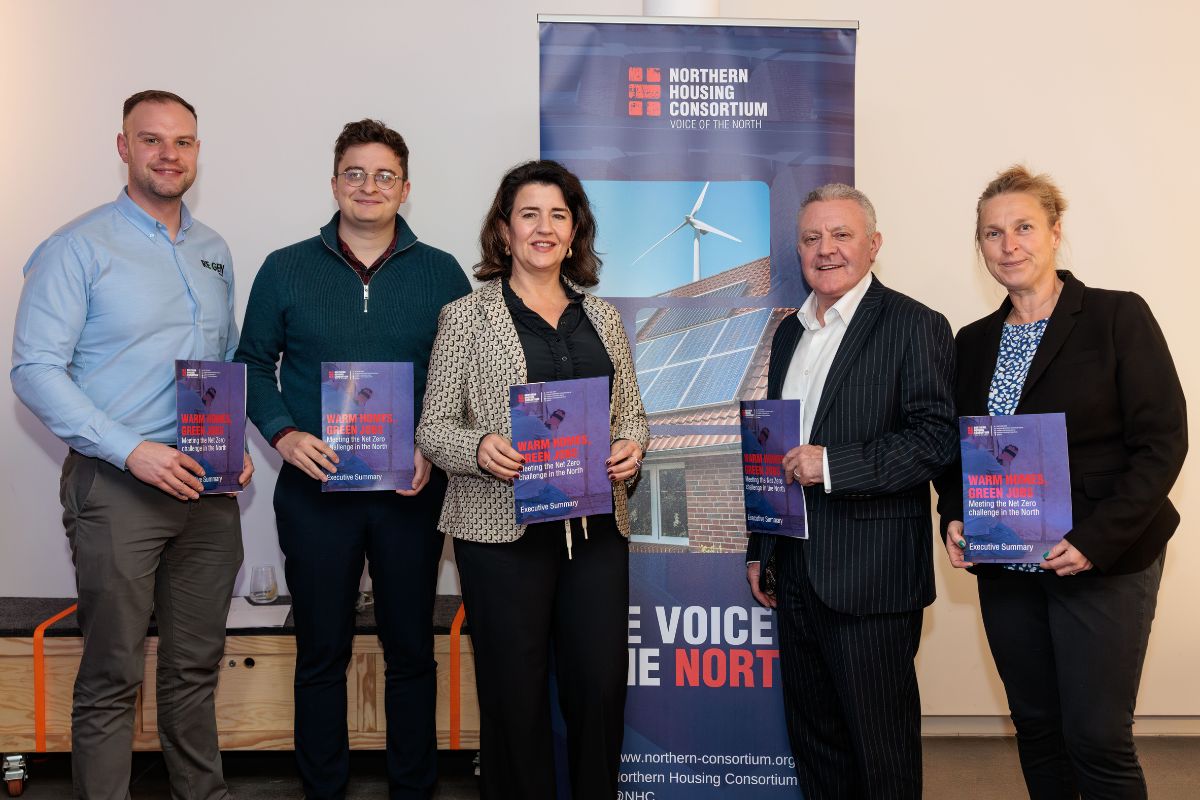Warm homes could create green jobs and boost the North’s economy
New research published by the Northern Housing Consortium (NHC) has set out how the social housing sector can take the lead in delivering warmer, greener homes across the North.

The NHC says that this has the potential to create up to 77,000 good green jobs across the North of England.
Warm Homes, Green Jobs: Meeting the Net Zero challenge in the North was launched at the Labour Party conference at an event attended by politicians, NHC members, contractors and think-tank representatives. Speakers at the launch of the research included Liz Twist MP, Luke Myer MP, Tom Lamb from RE:GEN Academy, the NHC’s Tom Kennedy; Livv Housing Group’s Tony Cahill, Communities that Work’s Lynsey Sweeney and Chris Brown of Climatise and The Labour Housing Group.
The new Government has pledged to invest an extra £6.6 billion over the next parliament for energy efficiency upgrades in five million homes. They recently announced they will consult on a proposal for all rented homes to achieve EPC C by 2030.
The report found that with the right Government investment, social housing providers will be able to boost the supply chain so it can deliver more energy efficiency upgrades for homeowners and the private rented sector.
The report calls for:
- Long-term consistent funding to decarbonise social housing. This will give contractors and housing providers the long-term certainty to invest in energy efficiency upgrades. To deliver at the right scale, £500m per year is needed in the North up to 2030, and £1 billion per year in the North up to 2035
- Further devolution of funding so that Mayoral Combined Authorities can take a lead in delivering energy efficiency in their area, meeting the needs of local communities. In areas which do not have a devolution deal, Net Zero Hubs could take on this role in partnership with local authorities
- Growth of a sustainable and inclusive workforce through local partnerships. These partnerships will tackle skills gaps using devolved adult education funding. Social landlords are key partners because of their unique insight as large construction and retrofit employers; anchor institutions in communities, and organisations with extensive experience of supporting residents into sustainable employment.
Chief Executive of the Northern Housing Consortium, Tracy Harrison, said:
“There are nearly a million households in the North living in fuel poverty. Investing in energy efficiency improvements will significantly bring this number down, as well as playing a big role in helping us reach net zero by 2050.
“The social housing sector owns 1.3 million homes in the North. It is the only housing tenure that has the organisational scale to significantly boost the supply chain and create thousands of new jobs. Investment in social housing is key to getting the infrastructure in place to roll out more energy efficiency upgrades to the private rented sector and homeowners.
“The biggest priority for all research participants was for the Government to provide long-term certainty about social housing retrofit funding. We found the ‘wave’ nature of government funding prevents the supply chain from scaling up as they do not have confidence in long-term demand. It also makes it harder for housing providers to plan strategically.
“Funding that is consistently available would smooth out demand for retrofit contractors, ease timescale pressures when delivering retrofit schemes, and support providers with a wider range of decarbonisation strategies. It should be devolved to Mayoral Combined Authorities so they can take a lead delivering energy efficiency upgrades in their area.”
As part of the research, 36 interviews were conducted with 50 people, including representatives from social housing landlords, local authorities, Mayoral Combined Authorities, contractors, and others who are working to decarbonise the North’s social housing.


